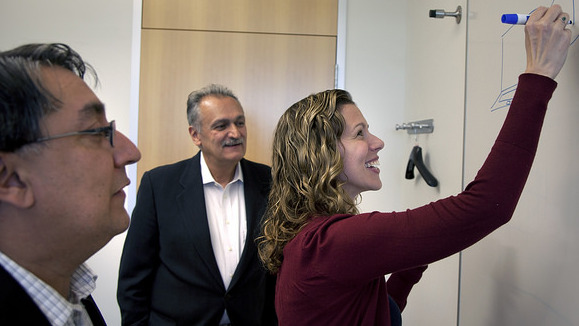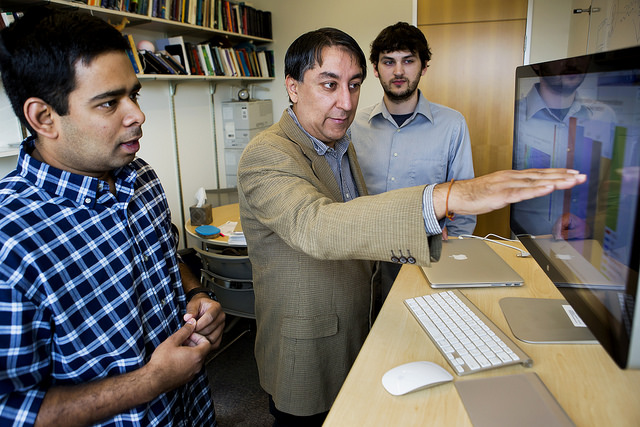Cognitive Computing
The Next Grand Challenge: Computers That Converse Like People
January 14, 2016 | Written by: Steve Hamm
Categorized: Cognitive Computing | IBM Research | IBM Watson
Share this post:
Computer scientists have long dreamed of creating machines that can carry on free-wheeling conversations with people. So far, in spite of tremendous efforts in the field of speech recognition, natural language processing and other facets of artificial intelligence, even the most loquacious computers and smartphones are not yet great conversationalists.
But that may change in the not-too-distant future.
IBM and the University of Michigan are combining forces to develop cognitive computing systems that can interact naturally with people–either via text or by speaking. This three-year “grand challenge” brings together more than one dozen IBM scientists and University of Michigan faculty members and students. Their initial goal is to create a cognitive advisor system to help students navigate their courses and programs.
To achieve breakthroughs in cognitive computing, IBM is forging research partnerships like this one with a number of highly-regarded academic scholars and labs–including a exploration of deep learning with Prof. Yoshua Bengio of the University of Montreal.
For David Nahamoo, the IBM Fellow who heads up conversational technology for IBM Watson, the University of Michigan project, which is called Sapphire, is the culmination of more than 30 years of research. “Now we can finally deliver on the dream and create computer systems that can converse with humans on human terms,” he says.

L to R, Satinder Singh Baveja, director of the Artificial Intelligence Lab; David Nahamoo, Chief speech officer, IBM Watson; and Emily Mower, provost, University of Michigan.
Eight University of Michigan faculty members will participate in Sapphire, along with several post-docs and grad students. The university’s Artificial Intelligence Lab is known for scholarship in natural language processing, robotics, reinforcement learning, deep learning, multi-agent systems and cognitive architectures.
Satinder Singh Baveja, the Lab director, says one factor that makes a breakthrough in computer-to-human dialog more likely now is that large amounts of dialog data with which to train computers is becoming available. The researchers in the student advisor project will have access to transcripts of thousands of counseling sessions between students and human advisors. “The availability of data is changing AI hugely in positive ways,” he says.
Until now, most computer-to-human conversations were based on hard-coded rules and decision trees. If a person says this, then the machine answers that. But it takes a tremendous amount of human labor to develop and maintain rule-based dialog systems, and they’re not flexible enough to be truly conversational.
The new collaboration seeks to break the logjam by enhancing rule-based systems with other technologies that enable machines to gain knowledge by interacting with humans and data. One approach is machine learning. A computer system is trained by being exposed to examples generated by humans until they learn to identify words and images when they encounter them. A second element is probabilistic reasoning. Machines understand more about the meaning of words from their statistical context. A third element is reinforcement learning. Machines improve their questions and answers by interacting with people and receiving feedback from them.
The researchers will use the cognitive student advisor as a test bed to help them develop systems that can be used for many kinds of human-to-machine interactions–everything from online travel planning and shopping to IT help desks and tax advisory services.
The first generation of such applications will be specialists. They will be capable of conversing expertly and in a human style about specific subjects, but not about “anything and everything”–like the machines computer science pioneer Alan Turing had in mind when he conceived the so-called Turing Test in 1950. But that will come later.
The pace of innovation in cognitive computing and artificial intelligence is quickening. If the IBM/University of Michigan team accomplishes all that they hope to, it will be another huge step forward for computers–and for humankind.
Meet the Newest IBM Fellows
Since the first class of IBM Fellows in 1962, IBM has honored its top scientists, engineers and programmers, who are chosen for this distinction by the CEO. Among the best and brightest of IBM’s global workforce are 12 new IBM Fellows who join 293 of their peers who have been so recognized over the last […]
How IBM is Advancing AI Once Again & Why it Matters to Your Business
There have been several seminal moments in the recent history of AI. In the mid-1990s, IBM created the Deep Blue system that played and beat world chess champion, Garry Kasparov in a live tournament. In 2011, we unveiled Watson, a natural language question and answering system, and put it on the hit television quiz show, […]
AI in 2020: From Experimentation to Adoption
AI has captured the imagination and attention of people globally. But in the business world, the rate of adoption of artificial intelligence has lagged behind the level of interest through 2019. Even though we hear that most business leaders believe AI provides a competitive advantage, up until recently, some industry watchers have pegged enterprise adoption […]




